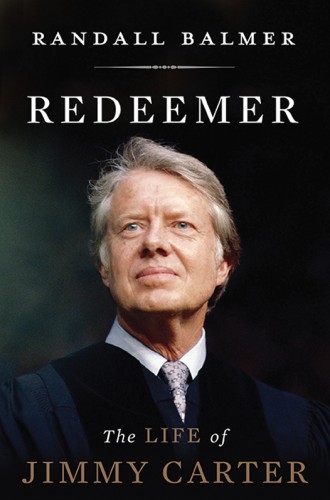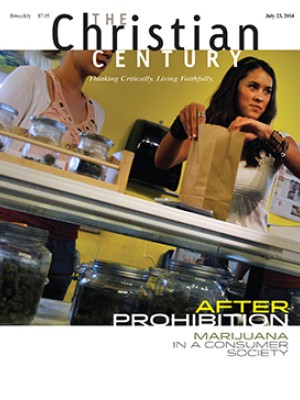Redeemer: The Life of Jimmy Carter, by Randall Balmer
In his acceptance of the Nobel Peace Prize in 2002—when the George W. Bush administration was laying the groundwork for an invasion of Iraq—Jimmy Carter stated, “I am not here as a public official, but as a citizen of a troubled world who finds hope in a growing consensus that the generally accepted goals of society are peace, freedom, human rights, environmental quality, the alleviation of suffering, and the rule of law.” It was a moment of redemption for Carter’s progressive views.
Carter had always sought to live by this moral code in his private and public life. However, it was not until his model postpresidency, when he was no longer captive to political factionalism, that he could fully enact his religious vision as a “citizen of a troubled world.”
Read our latest issue or browse back issues.
In his biography of the former president, Randall Balmer, a historian of religion at Dartmouth, uses Carter’s career to trace the treacherous history of progressive religious beliefs in the post-Watergate political environment.
Media accounts of Carter’s rise to national prominence heralded him as a representative of the New South, yet Carter’s upbringing and religious principles established his belief in racial and gender equality before the rights movements. In navigating the racial and class politics of the New South, Carter learned the wisdom of theologian Reinhold Niebuhr’s maxim: “The sad duty of politics is to establish justice in a sinful world.” After a bitter loss in his 1966 campaign for governor, Carter captured the governor’s office in 1970 by running as a populist who courted white segregationist voters. As the Macon Telegraph noted at the time, Carter was “a good man whose high standards have been undermined by political ambition.” It was not the last time Carter’s pursuit of political office conflicted with his religious sense of equality and fairness.
Carter’s run for presidency coincided with the media’s rediscovery of evangelicalism—or, in the preferred parlance of the era, “born-again Christianity.” In the 1970s the definition of evangelicalism was still at stake in media accounts about belief. Carter’s national ascendance paralleled the resurgence of a progressive religious vision. The 1973 Chicago Declaration of Evangelical Social Concern echoed Carter’s political belief in the importance of racial reconciliation, women’s equality, economic justice, and prison reform. In Balmer’s understanding, Carter’s personal story of resilience, humility, and redemption exemplifies progressive religious belief. Carter’s presidency, which had started with so much promise for progressive religion, ended with the religious right’s redefinition of evangelicalism along lines considerably more favorable to the Republican Party.
The biography functions best when Balmer demonstrates how religious beliefs influenced Carter’s policy decisions. He contextualizes 1970s politics as a morality play in which Carter assumed the role of “redeemer president” for Americans worried that their votes made them complicit in the dirty tricks of the Nixon administration. As articulated by Carter, evangelicalism stood for “care for the poor, concern for human rights, and an aversion to military conflict.” Carter did not, however, control how Americans understood his beliefs. His willingness to foreground his faith during the 1976 campaign helped him garner support among born-again Christians, but he damaged his long-term political viability when he assented to an infamous interview in Playboy. Once he was in office a stagnant economy, competing domestic interest groups, and the long-term consequences of American actions in the developing world combined to muddle Carter’s vision.
Although the Iranian hostage crisis arguably undid Carter’s presidency, Balmer suggests that it is in foreign policy that we see Carter’s guiding religious vision. Carter sought to replace the cold war’s good-versus-evil dualism with a guiding moral vision that the United States should pursue a foreign policy that is “more collaborative, less interventionist, and sensitive above all to human rights.” Most famously, Carter’s moral vision led to the 1977 revisions to the Panama Canal treaties, to the 1978 Camp David accords between Israel and Egypt, and to efforts to achieve limitations on nuclear weapons through the SALT II treaty (which Carter withdrew from Senate consideration after the Soviet invasion of Afghanistan).
Carter’s progressive evangelicalism faced greater uncertainty in the domestic context, where his ideas faced criticism from conservatives and liberals alike. In keeping with the book’s epigraph, “He came unto his own, and his own received him not,” Balmer argues that Carter’s fellow evangelicals turned on him. Progressive believers like Jim Wallis criticized Carter for failing to do more to help the poor amid a struggling economy. Meanwhile, emerging religious right leaders like Paul Weyrich and Jerry Falwell, as well as Billy Graham in back-channeling efforts, turned evangelical opinion against the incumbent and toward the strident confidence and rhetorical pandering of Ronald Reagan; away from progressive concerns and toward issues such as private school segregation, abortion, and—ultimately—“family values.”
One might question whether Carter’s defeat stemmed from a change of heart among evangelicals—his share of their vote dropped about ten percentage points from 1976 to 1980—or from a broader restructuring of American social, economic, and political life. Economists have shown that Carter’s presidency occurred just as postwar economic egalitarianism was beginning to recede. Balmer frames Carter’s term in office as a battle over the evangelical soul—Falwell in particular emerges as Carter’s conservative foil—but other historians have shown that larger processes redefined and rechanneled evangelical belief. Eschewing backlash theories of the religious right, historians have embedded the history of both conservative and progressive religious beliefs into broader narratives that foreground race and class while tracing the stories of deindustrialization, suburbanization, and the rise of the service economy. In this literature, the 1970s were a time of structural change as both parties catered to suburban Sunbelt voters.
For much of the past 35 years, conservative belief has defined American religious life. Although the progressive evangelicalism of the 19th century remains well known, the recent history of liberal belief is in need of recovery. Redeemer fits within this reconsideration of progressive religion, and Carter’s career path offers a way forward for progressives’ engagement as global citizens.







